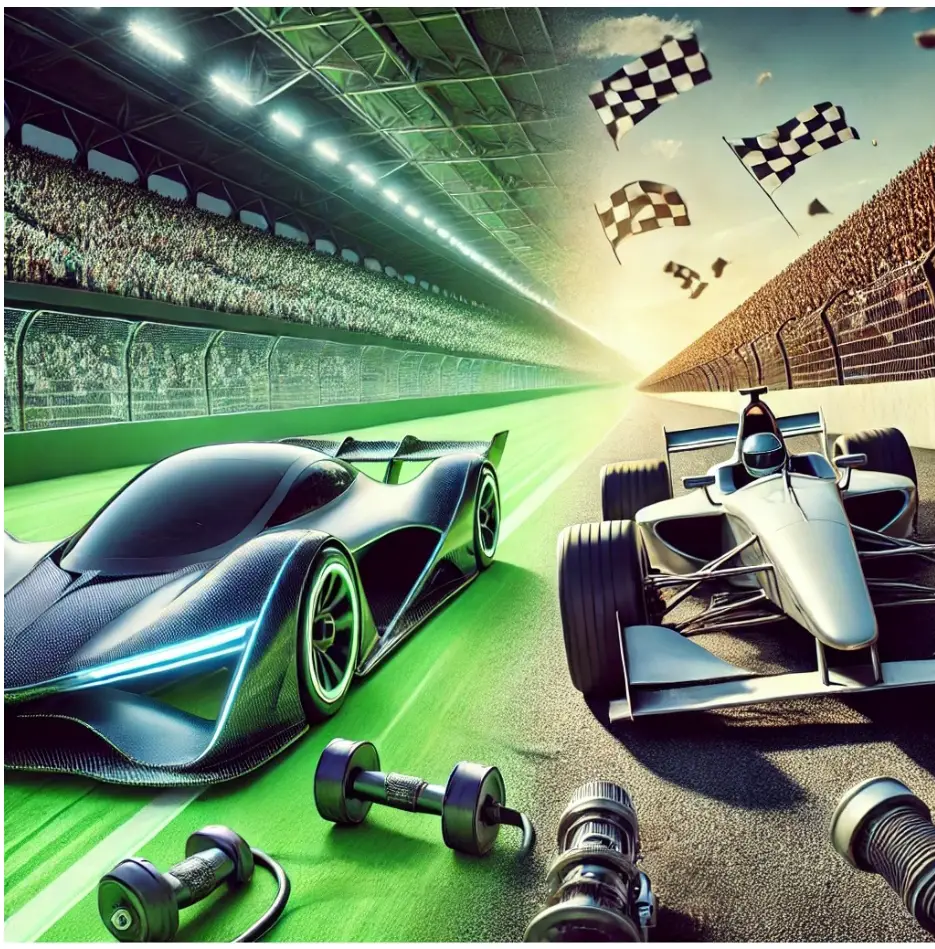Car racing has always been at the forefront of automotive innovation, pushing the boundaries of speed, performance, and technology. As the world shifts towards sustainability, the debate between electric and gasoline-powered racing cars is heating up.
This article explores the future of car racing, comparing electric and gasoline engines, and provides valuable insights for enthusiasts interested in both car racing and car shipping.
Image Credit Goes to AutoStar Transport Express
The landscape of car racing is undergoing a significant transformation. With advancements in technology and growing environmental concerns, the industry is at a crossroads between traditional gasoline-powered engines and emerging electric alternatives. This shift not only affects the performance and sustainability of racing cars but also influences the infrastructure, such as car racing tracks and car transport logistics. For racing enthusiasts and those involved in car shipping, understanding these changes is crucial for making informed decisions.
Types of Car Racing
Car racing is a diverse sport with various disciplines, each requiring different types of vehicles and expertise. Understanding the different types of car racing provides context for the ongoing debate between electric and gasoline engines.
Sprint Car Racing
Sprint car racing involves high-powered, lightweight cars racing on short oval or circular tracks. These cars are known for their agility and speed, making them a favorite among fans seeking thrilling, close-quarters competition. Sprint cars typically use powerful gasoline engines, but there’s a growing interest in electric alternatives due to their instant torque and acceleration capabilities.
Drag Racing
Drag racing focuses on straight-line acceleration over a short distance, usually a quarter-mile track. Drag racing cars, or dragsters, are among the fastest vehicles in the racing world, capable of reaching extreme speeds in mere seconds. The performance of drag racing cars heavily depends on engine power and reliability, areas where gasoline engines have traditionally excelled. However, electric drag racing is gaining traction, offering instant power delivery and reduced maintenance.
Rally Car Racing
Rally car racing takes place on a variety of terrains, including dirt, gravel, and asphalt, often over long distances. Rally cars must be versatile and durable, capable of handling diverse conditions. While gasoline engines are currently predominant, electric and hybrid rally cars are being developed to improve efficiency and performance in challenging environments.
Street Racing
Street racing occurs on public roads, often illegally, and involves high-speed competitions between modified street cars. Street racing cars are typically gasoline-powered, customized for enhanced performance. The rise of electric street cars presents a new avenue for enthusiasts looking to combine speed with sustainability, although regulatory and infrastructural challenges remain.
Gasoline vs. Electric Engines in Car Racing
The core of the debate lies in comparing the performance, environmental impact, cost, and technological advancements of gasoline and electric engines in car racing.
Performance Comparison
Gasoline Engines:
- Power and Torque: Gasoline engines provide high horsepower and torque, making them ideal for traditional racing disciplines.
- Refueling: Quick refueling times allow for shorter pit stops, which is crucial in races like drag racing and sprint car racing.
- Sound and Experience: The distinctive roar of gasoline engines is a sensory highlight for fans and drivers alike.
Electric Engines:
- Instant Torque: Electric motors deliver maximum torque instantly, offering superior acceleration, which is advantageous in drag racing and sprint car racing.
- Regenerative Braking: This feature improves efficiency and can be leveraged in rally racing for better energy management.
- Silence: Electric engines operate quietly, which can reduce noise pollution but may affect the sensory experience of racing.
Environmental Impact
Gasoline Engines:
- Emissions: Gasoline engines produce greenhouse gases and other pollutants, contributing to environmental degradation.
- Fuel Consumption: High fuel consumption leads to resource depletion and increased carbon footprint.
Electric Engines:
- Zero Emissions: Electric engines produce no direct emissions, making them a cleaner alternative.
- Energy Efficiency: Electric motors are more efficient, converting a higher percentage of energy into motion compared to gasoline engines.
- Sustainable Energy Sources: When powered by renewable energy, electric racing can significantly reduce environmental impact.
Cost Considerations
Gasoline Engines:
- Initial Cost: Gasoline-powered racing cars can be less expensive initially, given the established technology and widespread availability of parts.
- Maintenance: Regular maintenance is required to keep engines running optimally, which can add to long-term costs.
- Fuel Costs: High fuel consumption can lead to substantial expenses over time.
Electric Engines:
- Initial Cost: Electric racing cars typically have higher upfront costs due to the expensive battery technology and electric components.
- Maintenance: Electric motors have fewer moving parts, reducing maintenance costs and downtime.
- Energy Costs: Charging can be more cost-effective than refueling, especially when using renewable energy sources.
Technological Advancements
Gasoline Engines:
- Innovation Plateau: While advancements continue, the core technology has reached a maturity point, limiting radical performance improvements.
- Hybrid Systems: Combining gasoline engines with electric systems can enhance performance and efficiency.
Electric Engines:
- Rapid Innovation: The electric motor and battery technologies are evolving rapidly, offering continuous improvements in performance, range, and efficiency.
- Integration with AI and IoT: Electric racing cars can integrate advanced technologies for real-time data analysis and performance optimization.
The Future of Car Racing
As the automotive industry evolves, car racing is set to undergo significant changes. Electric and hybrid technologies are paving the way for a new era of racing, influencing everything from car design to racing strategies.
Electric Racing Series
Several electric racing series are emerging, showcasing the potential of electric motors in competitive racing. Examples include:
- Formula E: A fully electric racing series that has gained popularity for its focus on sustainability and innovation.
- Electric Drag Racing: Competitions specifically designed for electric dragsters, highlighting the instant torque and acceleration of electric motors.
- Electric Rally Championships: Rally events incorporating electric cars, emphasizing endurance and energy management over diverse terrains.
Hybrid Technologies
Hybrid racing cars, combining both electric and gasoline engines, offer the best of both worlds. These vehicles can switch between power sources, optimizing performance and efficiency based on race conditions. Hybrid technologies are particularly promising for rally racing, where versatility and adaptability are essential.
Evolution of Racing Tracks
Racing tracks are adapting to accommodate electric and hybrid racing cars. This includes:
- Charging Infrastructure: Installing high-speed charging stations at pit stops to ensure quick energy replenishment.
- Energy Management Systems: Implementing systems to monitor and manage energy usage during races.
- Sustainable Materials: Using eco-friendly materials for track construction and maintenance to align with the sustainability goals of electric racing.
Car Shipping for Racing Enthusiasts
For racing enthusiasts, especially those participating in events across different states, reliable auto shipping is essential. Whether transporting a high-performance racing car or a modified street racer, understanding the logistics of car transport ensures that your vehicle arrives safely and on time.
Importance of Car Transport in Racing
Racing involves frequent travel to various tracks and events, making car transport a critical component. Proper shipping ensures that:
- Vehicle Integrity: High-performance parts and modifications remain intact during transit.
- Timeliness: Cars arrive on schedule for races and events.
- Cost-Effectiveness: Efficient shipping methods save money, allowing racers to allocate more resources to their teams and cars.
Choosing the Right Car Transport Company
Selecting a reputable car transport company is crucial for the safety and reliability of your vehicle’s journey. Consider the following factors:
- Experience: Choose companies with a proven track record in transporting high-performance and racing cars.
- Insurance Coverage: Ensure the company offers comprehensive insurance to cover potential damages during transit.
- Customer Reviews: Read testimonials and reviews to gauge the company’s reliability and service quality.
- Specialized Services: Some companies offer climate-controlled or enclosed transport, which is ideal for valuable or customized racing cars.
Cheapest Ways to Ship a Car to Another State
Shipping a car across states can be expensive, but there are ways to minimize costs without compromising safety:
- Open Transport: The most cost-effective method, where cars are transported on open trailers. Suitable for standard vehicles but may expose racing cars to weather and road debris.
- Enclosed Transport: Offers protection from environmental elements and road hazards. While more expensive, it provides added security for high-value racing cars.
- Terminal-to-Terminal Shipping: Dropping off and picking up your car at designated terminals can reduce costs compared to door-to-door service.
- Flexible Scheduling: Being flexible with pickup and delivery dates can help secure lower rates.
- Compare Quotes: Obtain multiple quotes from different transport companies to find the best deal.
Tips for Safely Shipping a Racing Car
To ensure your racing car arrives in pristine condition, follow these tips:
- Prepare Your Car: Clean your car thoroughly to identify any pre-existing damages. Remove all personal items and secure loose parts.
- Document Condition: Take detailed photos of your car from all angles before shipping.
- Choose the Right Transport Type: Opt for enclosed transport for added protection.
- Secure Modifications: Ensure that all modifications and custom parts are securely fastened to prevent movement during transit.
- Communicate with the Transporter: Maintain clear communication with the transport company to stay informed about the shipping process and any potential issues.
Making the Right Decision: Electric or Gasoline?
Choosing between electric and gasoline engines for racing depends on various factors, including performance needs, environmental concerns, budget, and personal preferences.
Considerations for Electric Engines
- Performance Needs: If instant torque and acceleration are priorities, electric engines excel.
- Sustainability Goals: Electric racing aligns with environmental sustainability, reducing emissions and promoting green technology.
- Maintenance: Lower maintenance requirements make electric cars appealing for long-term racing endeavors.
- Innovative Potential: Electric engines offer opportunities for integrating advanced technologies and data-driven performance enhancements.
Considerations for Gasoline Engines
- Traditional Performance: Gasoline engines provide a proven performance track record in various racing disciplines.
- Fueling Infrastructure: Established fueling stations and quick refueling times support high-paced racing events.
- Sound and Experience: The visceral experience of gasoline engines remains a significant attraction for many racing fans and drivers.
- Cost Factors: Lower initial costs and widespread availability of parts make gasoline engines accessible for many enthusiasts.
Hybrid Solutions
Hybrid engines offer a balanced approach, combining the strengths of both electric and gasoline powertrains. This option is particularly suited for racing disciplines that require versatility and adaptability, such as rally racing.
Conclusion
The future of car racing is poised for a dynamic shift as electric and hybrid technologies gain prominence alongside traditional gasoline engines. Electric engines offer compelling advantages in performance, sustainability, and maintenance, while gasoline engines continue to provide proven reliability and a unique racing experience. For racing enthusiasts, understanding these developments is essential not only for performance decisions but also for logistical considerations like car shipping.
As the racing industry evolves, embracing electric and hybrid technologies will likely become increasingly important. Whether you’re a driver, team manager, or racing fan, staying informed about these changes will help you make the best decisions for your racing endeavors and vehicle transportation needs.




